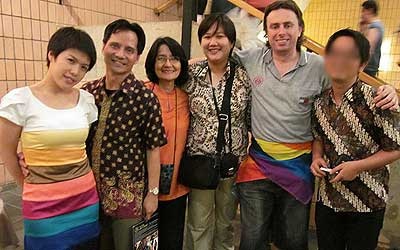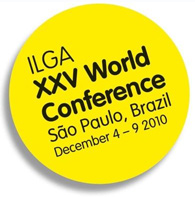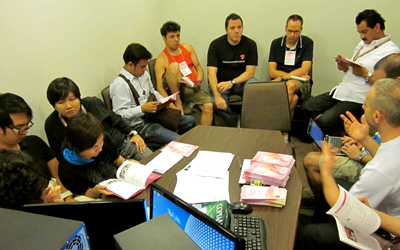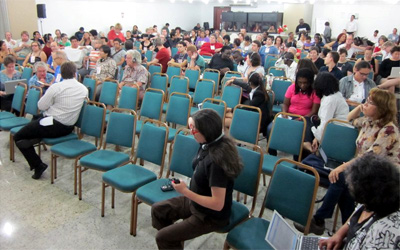250 individuals from 56 countries gathered in Sao Paulo in December under the ILGA banner. I don't have a full count for Asia, but we were mostly not there. Central Asia and South Asia stayed home. A Pakistani living in Sao Paulo participated. Japan and Korea were absent. Three from Indonesia. Two from Thailand (including this expat). Two from China. 44% of the members of ILGA are based in Europe (which has a population of 500 million). 10% of the member organisations are based in Asia (which has a population of 3.9 billion). The imbalance in favour of Europe is less than it used to be, having dropped below 50%.

From left: Eva Lee (China), King Oey (Indonesia), Anjana Tang Suvarnananda
(Thailand), Poedjiati Tan (Indonesia), Simon Margan (Australia),
Indonesia Representative (Indonesia). Photos courtesy of King Oey.
Brazil has lots of LGBT organisations, and the most pride parades of any place in the world. The Sao Paulo parade has attracted 3.5 million participants and observers. The national federation, Brazilian Gay, Lesbian, Bisexual, Transvestite and Transexual Association (or ABGLT), the first LGBT NGO from the global south to gain consultative status at the UN, had two years to plan the conference in the seductive beauty of Rio de Janeiro.
Last June it said it would put it off to 2011. The ILGA board began looking for new hosts. Three organisations in Sao Paulo became the new hosts and planning began in late July. This is the second time in a row that a host organisation defaulted. ILGA does not organise the conferences. The local hosts do that, under some ILGA guidance. The Vienna conference in 2008 suffered from a late relocation, though the local hosts delivered three upscale receptions and events. Sao Paulo did not match that.
The conference hotel was in the historic "Centro" area of Sao Paulo. The city was founded in 1534 by Jesuit missionaries. It became wealthy in the 19th century selling coffee to the world. Now it is the main industrial centre in Brazil, with close to 20 million people in the metropolitan area. Centro is not in good shape these days – grafitti on half the buildings and homeless sleeping on the sidewalks. Personal security was a concern. The glitzy areas are now Av. Paulista and Jardins, well removed from Centro. But throughout the older areas are exceptional examples of modernist architecture, some of it in decay after fifty years of being groundbreaking designs.
How was the conference? First the good points.

1. The opening plenary panel had a representative from the human rights office of the President of the Republic, who talked about the development of the groundbreaking "Brazil without Homophobia" policy and the national conference focused on implementation. A woman from the ministry of health of Sao Paulo described a health clinic for transgender people that seemed the best conceived of any.
2. There were 32 workshops over the four days of the conference. These were mainly initiated in advance by ILGA members.
3. A "Strategic Plan" for ILGA had been drafted and was discussed in workshops, which added some additional points. The plan was rubber stamped in the final plenary.
4. Gloria Careaga of Mexico and Renato Sabbadini of Italy were reconfirmed as female and male co-secretaries-general. Gloria had broken her elbow and was absent. Renato, charming and politically experienced from work within the European Parliament, generated respect and affection. ILGA has suffered under bad leadership for most of the last decade (Philipp Braun excepted). Now ILGA has two competent leaders who have been trying to turn ILGA around, expand staff, and get additional funding. Not an easy task. Some change is visible. There is a staff now of five in the Brussels office. This is too small, but higher than perhaps any time in the past.
5. Some new people and organisations were at Sao Paulo. The ANZAPI region (Australia, New Zealand and Pacific Islands) has been inactive. The ILGA board took the initiative of appointing two ANZAPI representatives, Lyn Morgain from Melbourne and Simon Margan from Sydney. ANZAPI will partner with ILGA Asia to jointly hold a regional conference in Sydney in 2011. This was a welcome move, given the blockage of the ILGA Asia conference in Surabaya, Indonesia in March by fundamentalist activists.

An International Day Against Homophobia and Transphobia (IDAHO)
meeting in progress.
But all was not sunny in Sao Paulo.
1. 250 delegates is a very low number for the primary international LGBTI democratic, membership organisation. ILGA is the only international umbrella organisation, and for the second conference in a row attendance was low.
2. No plenary speakers told us of the significance of Brazil's initiatives or of the various initiatives and issues in Latin America as a whole. We had government views of two initiatives in Brazil. No context for those. No comparisons. I left Brazil with no new information on developments in the region.
3. Any conference with 32 workshops delivers very different experiences to participants. Perhaps no one else was in exactly the same set of plenaries and workshops that I attended. This makes it important to have strong plenaries, to emphasise important issues and to give participants a sense of a common experience. The Geneva ILGA conference had a series of excellent plenaries. It set a high standard. Sao Paulo had only one, and it lacked critical commentary and perspective.
4. The workshops I found most useful were heavily dependent on people who work for other organisations. I commend John Fisher and Kim Vance of ARC International for their loyalty to ILGA. They reported on their work in Geneva and gave good information on the UN Universal Periodic Review Process. They did two or three workshops and were central in the launch of the Activists Guide to the Yogyakarta Principles. What they were reporting on were not ILGA initiatives. They have ILGA support in their work, but that support has been after the fact. ILGA itself has not had a program of UN lobbying. Please understand that this is more a description of ILGA and ILGA conferences than a criticism. ILGA provides a forum or a platform for partner groups. It allows a networking that no other forums allow. This gave space for ARC International, International Gay and Lesbian Human Rights Commission (IGLHRC), International Day Against Homophobia and Transphobia (IDAHO), International Resource Network and the Stop Trans Pathologization Campaign to describe their work and seek partners.
5. The Sao Paulo conference posed translation problems – requiring English, Spanish and Portuguese (the language of Brazil). Constantly there were translation problems. Thanks go to the volunteer translators, but problems were a constant factor, delaying business.
6. The conference ended with two business plenaries, approving resolutions and reports and minor constitutional changes. Elections were finalised and Stockholm announced as the site of the conference in 2012. In spite of a video by Gloria Careaga and a talk by Renato Sabbadini, the conference ended with a wimper, not a bang. There needs to be a memorable ending, a final act. Maybe next time.

I hope my dear readers will recognise that I am trying to be fair and balanced. ILGA has been an underachiever, as everyone loyal to the organisation would agree. The Sao Paulo conference was well below expectations. As someone whose activist career was in the West (before decamping to Bangkok eight years ago), I have looked to ILGA for stimulation from meetings with other activists and going to new places. I looked forward to Sao Paulo, wanting to hear more about Brazil and Latin America. I read three books on Brazil in advance, "Beyond Carnival," "Travesti" and "Brazil on the Rise." An aging activist like me knows a lot about Sweden, but much less about Brazil. The Sao Paulo conference did not help.
The co-secretaries general in their report to the conference cautioned everyone to remember that ILGA, with over 600 member organisations in all regions of the world, had finances that were "equivalent to those of a medium sized national organisation." Yet the organisation had a representativeness that was "genuine, relevant and unique." They were noting the disconnect – small resources, big mandate, ambitious structure. They said ILGA people were experts to activists and activists to experts, a complex dual role that funders often found difficult to understand. And ILGA political leaders are not paid – they are volunteers whose expenses are covered. In contrast the 'partner' organisations have paid leadership.
Brazil was often mocked by saying "Brazil is the country of the future – and always will be." Today Brazil is the lead country in the BRIC acronym, that groups (Brazil, Russia, India, China). These countries have risen to international importance both economically and politically. ILGA, for long, has been the organisation that logically would be an international leader over time. It stumbles. It underachieves. It survives. For new participants, the Sao Paulo conference was no doubt exciting. I was excited, truly delighted by the Paris ILGA conference in 2002, my first. The old hands complained that it was terribly organised. Even a sloppy ILGA conference can inspire. So we carry on, with hope and purpose.
Douglas Sanders is a retired Canadian law professor living in Bangkok. He can be contacted at sanders_gwb@yahoo.ca.
